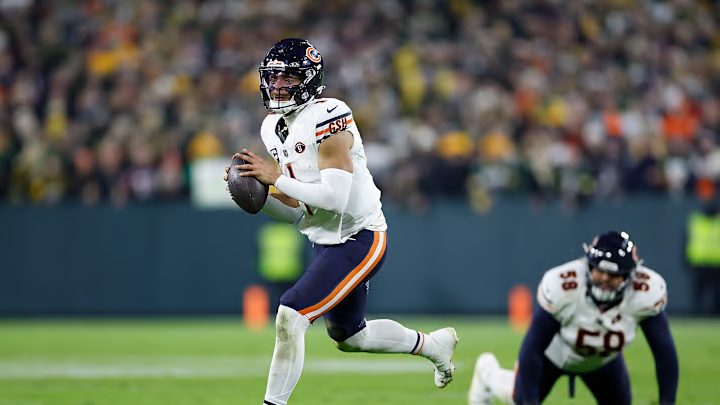With the Chicago Bears debating a change at the quarterback position, from Justin Fields to Caleb Williams, there has been a flaw in the logic being used by those in favor of a change.
Inconsistency has plagued Fields' first three seasons in the NFL with the Bears. On one hand, yes, if you want to use as evidence every single play Fields was a part of, this is a reasonable conclusion. However, everyone should know that when judging yay or nay to keep a young quarterback, the true benchmark needs to be what is his updated skill set at the end of his last season. To make the best possible decision, it is essential to discern whether he has grown enough beyond his past mistakes and refined his best skills enough that it all translates into whether a specific quarterback can be projected to be a successful NFL QB.
Based on Fields' performances in the last part of the season, it is reasonable to assume this is what happened during the weeks he had off from injury. This intelligent, dedicated to his craft, young quarterback used time off due to injury to reflect upon his game. All appearances are that he made the mental adjustment to stop doing the things that were not working and focus on what he needed to do to become the best version of himself.
The first six games he played once he came back from a thumb injury provided more than enough evidence that for the most part, he put his old self-defeating ways behind him. These significant changes more than justify the Bears keeping Fields.
Here are the changes he made starting with his first game back from injury against the Lions. Fields started to, consistently, complete passes even when he had open running lanes to take off in. He also did a professional job of going through his progressions and completing on-schedule pass plays. These completions included a number of dimes using good footwork in the pocket. One in particular that stands out is the TD pass to DJ Moore in the left corner of the endzone with snow falling at a crisp pace.
Very significantly, post-injury, Fields kept his eyes up, focusing on pass targets over pass rushers. He also used his eyes to fake out defenders from his intended target. He also did not waste layup pass plays when they were available.
